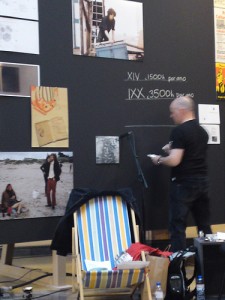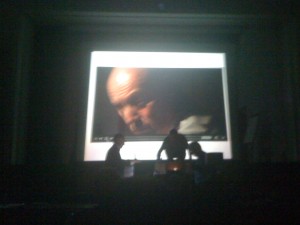-
Architecture
archive
art
Ballard
body
China
cinema
ecology
education
Europe
Ezra Pound
futurology
gothic
image
law
Literature
London
magic
memory
Modern
Modernism
museums
music
novel
performance
photography
poetry
politics
radical philosophy
science
science fiction
Sinclair
Situationism
sound art
Surrealism
technology
television
the avant-garde
The Future
Theory
thomson
time
Urban
visual culture
war
Posts tagged archive
Scratch Orchestra Dealer Concert Report
Tagged as archive, art, music, the avant-garde
Stefan’s report on the most excellent Scratch Orchestra event at the Culturgest, Porto, as part of their Cornelius Cardew: The Freedom of Listening exhibition, is now available here and also below the break.
A new website documenting the IMCC’s Archiving Cultures series of events and projects is now up at: http://archivingcultures.co.uk/
The website includes programmes, paper abstracts and artworks relating to the Hole in Time, Old Media / New Work and Vernacular Photographic Archives projects taking place at Westminster, in collaboration, respectively, with the Sussex Centre for German-Jewish Studies, the Magic Lantern Society and Photographer’s Gallery.
Archiving Cultures is organised by the IMCC’s Sas Mays and follows on from the 2008-09 research project, funded by the AHRC Beyond Text award, entitled ‘Spiritualism and Technology in Historical and Contemporary Contexts’.

Activating Brixton Art Gallery, 1983-86: Archives and Memories
Saturday 5th June 2010, 11am-4pm
Westminster Forum, University of Westminster, 32 Wells street, London W1T 3UW
A collaboration between BACA (Brixton Artists Collective Archives) group, and the 198 Contemporary Arts and Learning, the project 50 Reasons to Celebrate, Brixton Art Gallery – 1983-86, Archiving Brixton Art Gallery & Artists Collective (2010-2012) will be officially launched in Autumn 2010. BACA consists of five individual and original members of the Brixton Artists Collective: Teri Bullen, Guy Burch, Françoise Dupré, Rita Keegan, and the IMCC’s Stefan Szczelkun. They were part of a significant group of artists, the Brixton Artists Collective, and were instrumental in the foundation, development and running of the Brixton Art Gallery.
The ‘Activating Brixton Art Gallery, 1983-86: Archives and Memories’ symposium at Westminster is the first of two university-based symposia that will contribute to the Project’s research and development in relation to content, context, process and dissemination. An invited group will discuss the Brixton Art Gallery & Artists Collective’s socio-political and artistic concerns and contemporary relevance.
Speakers include: Paul Dash, Department of Educational Studies, Goldsmiths; Adrian Glew, Tate Archive; Althea Greenan, curator Women’s Art Library, Goldsmiths; Ajamu, artist; Sally Mould, Brixton Art Gallery exhibiting artist and Copyart.
The 50 Reasons to Celebrate, Brixton Art Gallery – 1983-86 project promotes and celebrates the achievement and legacy of the Brixton Art Gallery & Artists Collective and provides contexts and opportunities for the re-opening of existing archives and for future archiving of the Gallery and its Collective. The project incorporates public events and participation including a postcard project, an oral history project, a community archiving project, community-based workshops, gallery talks, symposia, a publication and a major archiving exhibition at the 198 Contemporary Arts and Learning (winter 2011). At the end of the Project, Brixton Art Gallery & Artists Collective’s old and new archives will be transferred and donated to Tate Archive for safekeeping and for broader public access (Spring 2012). Lambeth Archives, Tate Archive, Young People’s Programmes, Tate Britain and the Women’s Art Library, Goldsmiths, University of London have confirmed their support. Artist Studio Company, Autograph ABP, Birmingham City University, London School of Economics, Hall Carpenter Archive and the University of Westminster are also confirmed partners.
For further details about the syposium, please contact Stefan Szczelkun at: S.Szczelkun@westminster.ac.uk
For more information about the Brixton Art Gallery and its Collective and first 50 exhibitions please visit the website set up and developed by Brixton Art Gallery & Artists Collective co-founder Andrew Hurman: http://brixton50.co.uk
The Hole in Time: Full Programme
Tagged as archive, radical philosophy, Theory, time

The Hole in Time: German-Jewish Political Philosophy and the Archive
Date: Wednesday 23rd June – Thursday 24th June 2010, 9.30-6.00
Venue: Portland Hall, University of Westminster, 4-16 Little Titchfield Street, London W1W 7UW
Admission is free, but, since places are limited, please contact the organisers to book a place by the 17th of June at theholeintime@live.com
Wednesday 23rd of June
9.30 – 10.00 Introduction: Sas Mays (Westminster), Leena Petersen (Sussex)
10.00 – 12.00 Panel 1: Modern Crisis and the History of the Present – Part 1
Nicholas Lambrianou (Birkbeck): ‘Figures of Interruption: Philosophical Dramas of Temporality and History in Benjamin and Rosenzweig’
Sami Khatib (FU Berlin): ‘The Messianic and the Archive: Walter Benjamin’s “Politics of Time”’
Leena Petersen (Sussex): ‘Messianic Libertarianism and Linguistic Philosophies of History in Benjamin and Related Writings of His Time’
Chair: Christian Wiese (Sussex)
1.00 – 3.00 Panel 2: Poetics of Temporality
Howard Caygill (Goldsmiths): ‘Paul Celan’s Visual Archive’
Nitzan Lebovic (Tel Aviv / Sussex): ‘Paul Celan: Language of Loss at the Heart of Time’
Shela Sheikh (Goldsmiths): ‘The Wounded Archive: Derrida Reading Celan’
Chair: Keston Sutherland (Sussex)
3.30 – 5.30 Panel 3: The Temporality of Archives – Part 1
Elina Staikou (Goldsmiths): ‘Vigil of the Archive: On Derrida Dreaming Benjamin’
Rebecca Dolgoy (Montreal / FU Berlin): ‘The Work of Art as Archive: Examining Adorno’s Zeitkern as Time Capsule’
Tommaso Speccher (FU Berlin): ‘The Hole in Space: Fragmenting and Re-piecing the Archive between Walter Benjamin and Daniel Libeskind’
Chair: John Roberts (Wolverhampton)
Thursday 24th of June
10.00 – 12.00 Panel 4: Modern Crisis and the History of the Present – Part 2
Reut Paz (Humboldt University Berlin): ‘The Legal Transcendentalism of Hans Kelsen as a Hole in Time’
Birte Loeschenkohl (Frankfurt): ‘Kairos: The Right and Opportune Moment as a Caesura in and of Time’
Veronika Koever (Queen Mary): ‘Reversing the Irreversible: Jean Améry’s “ressentiments” and the Moralisation of Time’
Chair: Leena Petersen (Sussex)
1.00 – 3.00 Panel 5: The External Archive
Andy Fisher (Goldsmiths): ‘”Quiet Life”: History, Pathos and the Archive in Ernst Friedrich’s Kriege dem Krieg’
Manu Luksch (London): ‘Moonwalking in Real Time’
Chair: Esther Leslie (Birkbeck)
3.30 – 5.30 Panel 6: The Temporality of Archives – Part 2
David Cunningham (Westminster): ‘Abstract Times: Benjamin, Kafka and the Modernism of Tradition’
Matthew Charles (Middlesex): ‘The Snow Line of the Archive: Walter Benjamin On the Trail of Old Letters’
Andrew McGettigan (Central Saint Martins College of Art & Design, London): ‘The Archive and the Idea: Walter Benjamin’s Experiences of Time’
Chair: Nitzan Lebovic (Tel Aviv/Sussex)
Organised by Sas Mays (Westminster), and Leena Petersen and Nitzan Leibovic (Sussex), as part of the research project ‘Archiving Cultures’ at the IMCC.
Call for Papers: Temporality and the Archive
Tagged as archive, Theory, time

The Hole in Time: German-Jewish Political Philosophy and the Archive.
A call for papers for a workshop organised by the Centre for German Jewish Studies at Sussex and the Institute for Modern and Contemporary Culture at Westminster
23rd – 24th June 2010
Abstracts by the end of January 2010 to: theholeintime@live.com
Left discussions of politics and history owe much to German-Jewish theories of temporality that emerged in response to the political crises of twentieth-century Europe; yet, other than in the attention paid to issues of technological memory in Benjamin, there has been relatively little discussion of the archival ramifications of, for example, Adorno, Bloch, Celan, Rosenzweig, and Simmel, as well as other canonical Marxist thinkers. While Benjamin’s thought has often been mobilised to think the revolutionary potential of the archive, less has been done to think through the archival attitudes and implications of the work of such other thinkers, or the extent to which such attitudes are specifically predicated upon German and Jewish philosophical and political tradition. Continue reading Call for Papers: Temporality and the Archive


The Institute for Modern and Contemporary Culture
University of Westminster Department of English, Linguistics and Cultural Studies
32-38 Wells Street, London W1T 3UW. United Kingdom.


